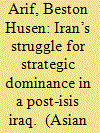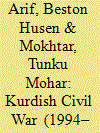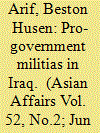|
|
|
Sort Order |
|
|
|
Items / Page
|
|
|
|
|
|
|
| Srl | Item |
| 1 |
ID:
167683


|
|
|
|
|
| Summary/Abstract |
Iran's influence and presence in Iraq have increased significantly in recent years. The collapse of the Saddam's dictatorship in 2003, after the US invasion, served to inflate Iran's influence in Iraq, particularly in the post-ISIS era. In this connection, Iran has used various means and tools to develop its strategy in Iraq. This article argues that Iran's current strategy in Iraq stems from a Realpolitik agenda rather than an ideological one, concerned more with political, economic, and security interests than pursuing revolutionary objectives per se. To this end, Tehran has largely relied on long-established relationships with several pro-Iranian political parties and militia groups. These relationships are often couched in religious ideological terms as a foundation and justification for its future strategy in post-ISIS Iraq. The questions that this paper will address are the following: what was Iran's role in defeating ISIS in Iraq? How has Tehran benefitted from its long-term relationships with Iraqi political parties and militia groups? What are the Iranian sources of power in Iraq and how do they help Iran gain strategic dominance in Iraq?
|
|
|
|
|
|
|
|
|
|
|
|
|
|
|
|
| 2 |
ID:
187222


|
|
|
|
|
| Summary/Abstract |
In 1994, two years after the foundation of a de facto Semi-Autonomous Kurdistan Region, a civil war between the Kurdistan Democratic Party (KDP) and the Patriotic Union of Kurdistan (PUK) broke out, jeopardizing all the Kurdish national movement had achieved. While the US-brokered Washington Peace Agreement in 1998 brought an end to the civil war, its consequences remained entrenched in the region's socio-political and governance framework. This article examines how the Kurdish civil war shaped the governing system in the Kurdistan Region of Iraq (KRI) for a decade and caused the region to divide into two different administrations, impeding the establishment of effective governmental institutions. This analysis demonstrates that the governing system reflected partisan demands during and after the civil war, making it difficult to separate the political parties and the government or state apparatus.
|
|
|
|
|
|
|
|
|
|
|
|
|
|
|
|
| 3 |
ID:
179348


|
|
|
|
|
| Summary/Abstract |
Along with Iraqi security forces, pro-government militias, known as Popular Mobilisation Forces (PMF, also “Hashd al-Shaabi” in Arabic), played a significant role in defeating ISIS. Iraq's engagement with these armed groups during the fight against ISIS empowered and legitimised them within the country. Yet, they often committed human rights violations and were involved in violent activities against the United States embassy, personnel, and military bases. However, since 2014, these groups have been acting as pro-government militias and are legally part of the Iraqi security forces. Yet, some of them have declared loyalty to Iran and act as proxy forces for Tehran. This article argues that pro-government militias in post-ISIS Iraq have negative impacts on security and human rights in the country because most of these groups were previously established based on sectarian factors and proximity to Iran. It also argues that while they are largely regarded as having had an essential role in defeating ISIS, their presence in a post-ISIS Iraq will threaten Iraq's stability.
|
|
|
|
|
|
|
|
|
|
|
|
|
|
|
|
|
|
|
|
|